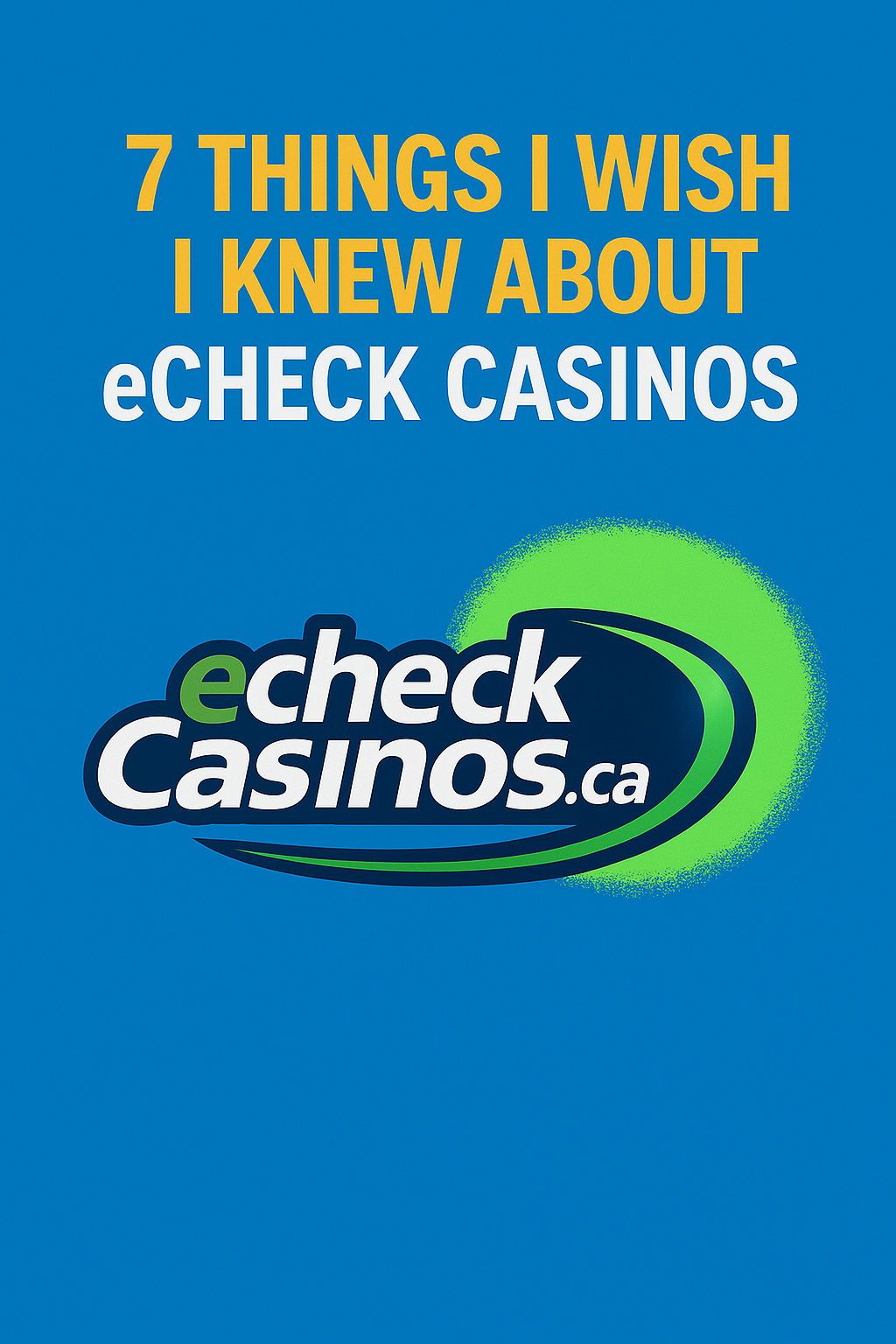
I’ve learned quite a lot about eCheck casinos ever since I deposited my first $5 on Captain Cooks back in the day. Now granted, I’m not a high roller—or a whale, as they’re commonly called in the iGaming community—but I’ve picked up quite a few things over the years.
Why did I stick with eCheck casinos all this time? Well, I started with poker back in the day. PokerStars had (and still has) this deposit option simply called Instant eCheck—and it basically does just that. I loved the simplicity, the fact that I didn’t have to share my bank details directly with the casino, and I was hooked from then on.
Personally, I’ve never trusted crypto or non-fiat deposit options—especially with so many stories of theft and hacking floating around these days—but to each their own.
Anyway, without further ado, here are 7 things I’ve learned along the way:
1) You Might Need to Unlock eCheck First

Yes, this one was a great disappointment. eCheck isn’t guaranteed until you prove yourself—that means showing the casino that you’re a serious customer. Why? Because of rampant fraud in the market. Some bad actors make it worse for everyone.
Proving yourself, in this case, means meeting the eCheck unlock requirements. These vary by site/brand, but usually fall into one of the following:
- Make one deposit using a non-eCheck deposit option (must be at least minimum deposit)
- Go through a time gate (of up to two weeks)
- Make a number of deposits and go through a time gate (the toughest requirement)
- Apply and become a VIP player (if you’re a high-roller)
When I started on Captain Cooks, I couldn’t find the eCheck logo and thought the brands were doing false advertising—not just them, but any other brand I found that claimed to accept eCheck. I’d log in and could never find the eCheck deposit option.
What was going on? Well, it’s just as I said—eCheck has to be earned, somehow. When the casino has your trust, not only will they offer you the eCheck feature, but they’ll also increase your daily spending limits.
2) eChecks Aren’t Instant (But They’re Close Enough)

This is true for both deposits and cashouts. What I found is that eCheck takes roughly three days to arrive at the casino. However, the good news is that operators credit you with the funds instantly. So in that way, practically speaking, they are indeed instant.
However, when players abuse the trust casinos place in them, they might see this feature restricted. This is what happens on PokerStars, for example. If the first eCheck deposit bounces (because the player charges back before the funds hit the casino), then for their next deposit, they’ll need to wait for the full clearing time.
Again, this shows why using eCheck requires trust from casinos, and why making a good impression at all times matters. Chargebacks are viewed very negatively by operators—and are also illegal when done maliciously to scam the casino or to profit from bonus offers at no cost.
Withdrawals, however, will never be instant. The timeframe on the jackpotcity.ca site is 1 to 3 days, and this is in line with my experience. You’ll never get the same withdrawal speeds as crypto, or even a modern e-wallet, but at least you’ll know your funds will arrive safely and securely—and that’s good enough for me.
3) Withdrawals Can Be Delayed by Weekends (and Bank Holidays)
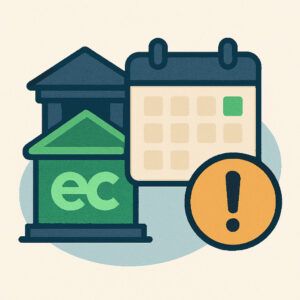
Here’s something I wish I’d realized earlier: even after your eCheck withdrawal gets approved by the casino, it’s still at the mercy of traditional banking hours. That means weekends, holidays, and even late-day processing cutoffs can stretch what should be a 1–2 day wait into something closer to 4 or 5 days.
This isn’t the casino dragging its feet—it’s just how banks operate, especially with eChecks. The approval is just step one. After that, you’re in the hands of the bank’s clearing schedule.
Pro tip: Request your withdrawals early in the week—ideally Monday or Tuesday morning—to give them the best shot at clearing before the weekend hits.
4) Not all “eCheck Casinos” Actually Accept eCheck
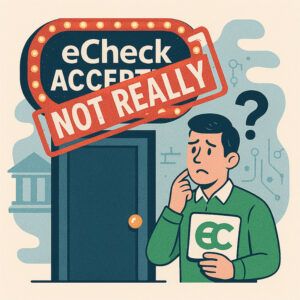
This one might be confusing to you, but it points to a broader problem in the industry. Some operators have noticed that adding logos of common deposit options (that they don’t actually accept)—like American Express, for example—attracts a new clientele to their site.
I’m not sure “attract” is the right word here, because they’re not actively marketing their Amex acceptance. But what it does is not deter American Express cardholders. So, for their bottom line, a lot of casinos try to feature as many deposit option logos as possible.
Sometimes it’s half-correct—in that they used to offer the method in the past, but they choose to keep the payment logo on their homepage to avoid deterring new players.
This is the case with a brand like Cash Cabin, which technically still offers eCheck to its legacy players, but has stopped offering it to new players. Still, they feature the eCheck banking logo on the homepage, which might make some feel that it’s still on offer.
Personally, I’m not a fan of the practice. I understand the hustle, but it makes it hard to know if a specific deposit option is actually accepted or not. These days, the only reliable way to find out is often through live chat—and that’s tedious, especially if they use AI chatbots.
5) Real eCheck Casinos (Like Jackpot City) Might NOT Even Show eCheck in the Cashier
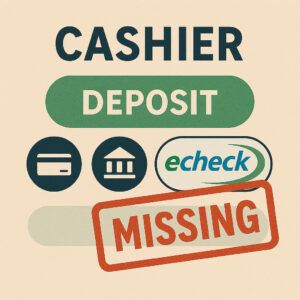
Here’s something that tripped me up early on: just because a casino accepts eCheck doesn’t mean you’ll see it listed in the cashier right away. Some sites—like Jackpot City—dynamically show payment options based on things like your location, account age, or even deposit history.
This ties back in to the deposit requirements. Usually to see EFT deposit options, not just eCheck but also iDebit and Instadebit, you typically need to have an “aged account”. Otherwise your cashier screen will look somewhat empty. By default they usually show payment cards like Visa and Interac.
The truth is you might not see eCheck until you’ve made a first deposit using another method, completed KYC, or simply waited a bit.
Moral of the story: just because eCheck isn’t visible doesn’t mean it’s not available. Sometimes, you just have to unlock it. Frustrating, I know.
6) High-Rollers Get Higher eCheck Limits

There are two VIP programs in Canada that offer very high eCheck deposit limits to members: Casino Rewards and VIP Preferred.
With the former, high rollers are assigned a personal agent or host who helps them with deposits. Higher limits and priority processing for both deposits and withdrawals are key perks—though they typically need to be requested by the player.
VIP Preferred is essentially an enhanced or premium eCheck service, where the limits are much higher than usual by default.
Regarding limits for average eCheck depositors, not all sites are the same. Some have a $1,000 max deposit limit at one time—which is three times less than Interac—not very impressive as a deposit method. However, these limits are usually fine for most casual players.
Even if you’re a casual player and need a higher limit, as long as you’ve been playing for a while without any chargebacks, the casino will often accommodate your request without much hesitation.
If you’re a low roller, the deposit limits won’t be an issue. For context, at Spin Casino, you can get started with just a C$10 minimum deposit and cash out once you’ve hit C$50 in winnings.
7) The Frequency of Your Deposits and Cashouts Can Affect Your Fees
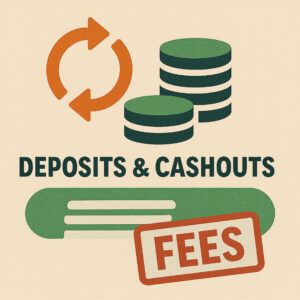
Here’s something most players don’t think about until it starts hitting their wallet: how often you deposit or withdraw using eCheck can impact the total fees you pay—especially when you’re dealing with lots of small transactions.
Why? Because most Canadian banks apply flat fees per transaction, not per dollar amount. So whether you deposit $50 or $500, you might still get hit with the same $0.75 or $1.50 bank fee. Same goes for withdrawals. That means if you’re constantly cashing out small wins—or depositing bit by bit—you could be racking up fees that would’ve been avoidable with fewer, larger transactions.
One way around this? Raise your limits (some casinos will happily accommodate you, especially if you’ve been playing consistently and avoiding chargebacks). That way, you don’t feel the need to split everything up.
We actually built a tool to help with this exact issue. You can check out the eCheck Fee Calculator to see how your fees stack up across different banks, deposit sizes, and even withdrawal scenarios. It takes the guesswork out of budgeting and makes it way easier to plan your iGaming sessions like a pro.
Bottom line: whether you’re a casual player or a high roller, grouping your deposits and withdrawals when possible can save you money and keep your banking smoother.
Conclusion
There you have it, folks. Re-reading the above, I realize I have quite a lot more to share, so I could definitely see myself writing a second part to this post. But in general, I’ve been quite satisfied as an eCheck user.
It’s something not every gamer knows about, and it does offer some conveniences that are genuinely important to me. We didn’t get into the obvious safety benefits here, but I’ll be sure to save that for part two.
I hope you enjoyed this format—it also allows me to process my thoughts and be helpful to our readers in a more direct way.





